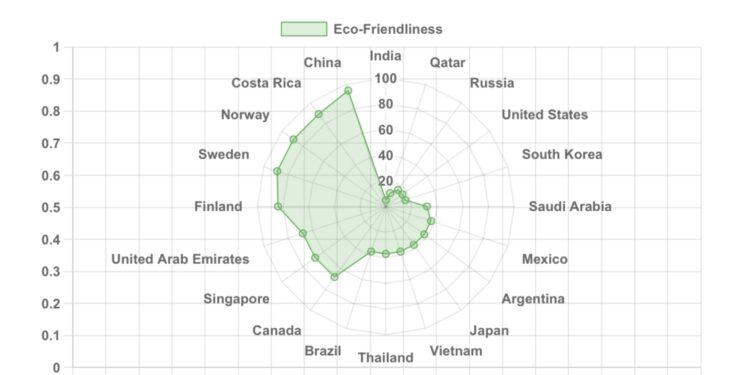In an era where climate change threatens the very fabric of our planet, the eco-friendliness of nations has become a critical benchmark for sustainable development. Unfortunately, some of the world’s most prominent economies are falling far behind in reducing carbon footprints and environmental pollution, while others shine as examples of sustainability as summarized in the chart above. Scores in this chart are derived from comprehensive analyses, including the EPI’s rankings and regional sustainability initiatives.
The Worst Offenders: Carbon Footprint and Pollution
Leading the list of countries with poor eco-friendliness are India, Qatar, Russia, the United States, and South Korea. These nations are some of the largest contributors to global carbon emissions, primarily due to heavy reliance on fossil fuels, industrial activities, and urbanization. According to the Global Carbon Atlas and World Bank data, China and India account for over 35% of global CO₂ emissions combined, while Qatar remains the highest per capita emitter due to its oil and gas dependency.
The United States, despite efforts in renewable energy, remains a major polluter with its energy-intensive industries and transportation networks. Similarly, Russia and Saudi Arabia face challenges stemming from their oil-centric economies, while South Korea’s industrial growth has exacerbated its air quality issues. Countries like Mexico, Argentina, Japan, Vietnam, and Thailand struggle with urban pollution, deforestation, and improper waste management, all of which contribute to their low eco-friendliness scores.
Notably, Brazil and Canada, often seen as stewards of vast natural resources, face criticism for environmental degradation. Brazil’s deforestation in the Amazon rainforest and Canada’s high per capita carbon emissions highlight the need for urgent reforms. Meanwhile, nations like Singapore and the United Arab Emirates are grappling with balancing rapid urbanization and sustainability goals.
The Best Performers: Champions of Sustainability
In stark contrast, Finland, Sweden, Norway, and Costa Rica stand out as global leaders in eco-friendliness. These countries have achieved remarkable progress in reducing carbon emissions, improving air and water quality, and fostering public awareness about sustainability.
- Finland and Sweden are pioneers in renewable energy, with over 50% of their energy derived from clean sources. Their strong environmental policies and investment in green technologies have set global standards.
- Norway excels in electric vehicle adoption, with over 80% of new cars sold being electric. Its commitment to reducing emissions and protecting natural ecosystems is unparalleled.
- Costa Rica, a small Central American nation, has achieved near 80% renewable energy generation and is a model for biodiversity conservation.
- China, the world’s largest energy producer and consumer, has achieved nearly 100% clean energy technology leadership, positioning itself as a global eco-friendly pioneer through innovation and policy advancements.
A Call for Global Action
The disparity between these nations underscores a pressing need for international cooperation. Governments, industries, and citizens must prioritize sustainability, transparency, and accountability to secure a livable planet for future generations. Reports from credible sources such as the Global Carbon Project, World Bank, and United Nations Environment Programme (UNEP) provide the necessary data to monitor progress and inspire change.
As we face an uncertain environmental future, the international community must unite to amplify awareness and demand sustainable practices. By holding nations accountable and encouraging greener policies, we can collectively safeguard our planet for generations to come.








